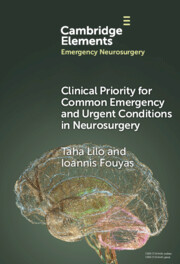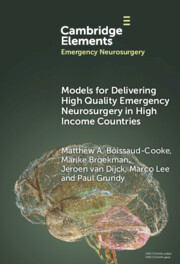Refine search
Actions for selected content:
2 results

Clinical Priority for Common Emergency and Urgent Conditions in Neurosurgery
-
- Published online:
- 04 April 2024
- Print publication:
- 18 April 2024
-
- Element
- Export citation

Models for Delivering High Quality Emergency Neurosurgery in High Income Countries
-
- Published online:
- 06 January 2024
- Print publication:
- 01 February 2024
-
- Element
- Export citation
